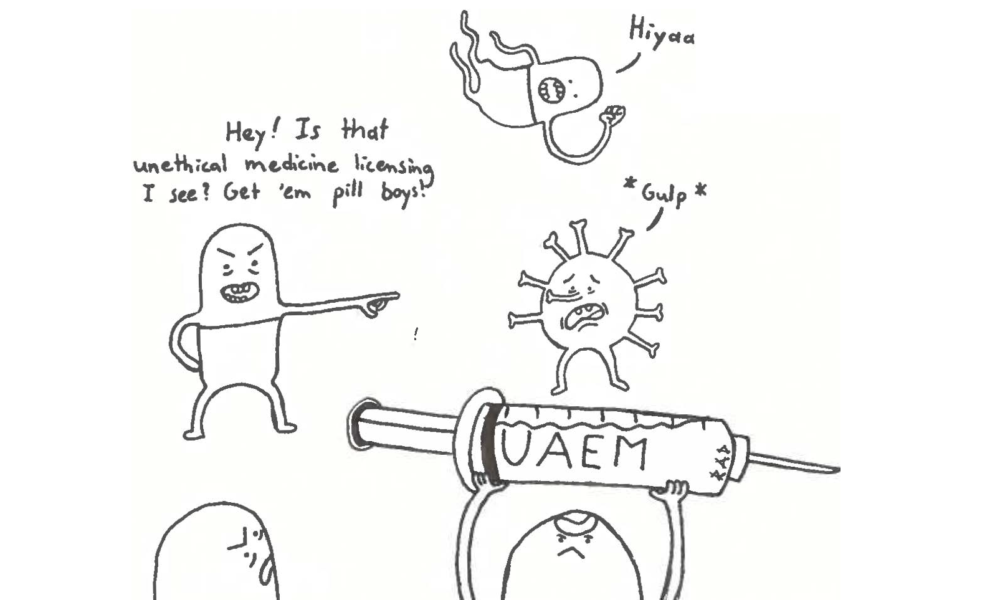Why advocate for healthcare in Canada if it’s perceived as universally free? Despite the common misconception, increasing awareness of healthcare disparities in Canada—particularly highlighted by the COVID-19 pandemic—emphasizes the urgent call for equitable access to medicines. In the fight for affordable care, McGill students are stepping up to advocate for a critical cause: Global health equity.
Universities Allied for Essential Medicines (UAEM) McGill, a local chapter of the international organization, is led by passionate students who are committed to addressing the barriers that prevent essential medicines from reaching those who need them most.
A mission to educate and advocate
United by a focus on both education and advocacy, the team is challenging the status quo within academic research.
“I had been interested for a while in access to medicine, and at UAEM I saw an opportunity to learn in an extremely motivating yet kind environment,” UAEM McGill President Amanda Leloup, U3 Arts, wrote to the The Tribune.
One of UAEM’s initiatives, The Canadian Report Card, measures how well universities follow equitable licensing practices. The evaluation system assesses whether institutions such as McGill adhere to frameworks like the Global Access Licensing Framework (GALF). This report card is a crucial tool used to hold universities accountable, ensuring that research innovations are accessible to everyone, not just those who can afford them.
By assessing and publicizing how universities manage their research outcomes, the report card pushes for greater transparency and fairness. For students, researchers, and policymakers, understanding and engaging with the report card is essential to advocacy efforts for policies that promote equitable access to essential medicines.
“We hold the university accountable to ensure that there is fair and equitable access to innovations paid for through tax money,” Leloup said. “We want to make sure McGill lives up to their equitable licensing agreements.”
In addition to their ongoing efforts, UAEM McGill is hosting its annual conference in Montreal later this year. This milestone event will bring chapters from across North America together to discuss the role of Canadian healthcare, Indigenous rights in medicine, and other topics regarding global health equity.
The conference will address the reality that even with public healthcare, affordability and accessibility remain pressing issues for marginalized communities in Canada.
Projects and calls to action
Last April, the team launched a Donation Tracker website that invites manufacturers, shelters, and community groups to donate essential goods, such as masks and medications, to vulnerable populations in Montreal. In promoting the website, the team will be donating to The Open Door during their collaborative donations drive, sending clothes, food, and toiletries to those in need.
Additionally, their Open Science initiative advocates for transparency in medical research, ensuring that students, researchers, and the public can freely access research findings without costly paywalls. This is essential for students, as it enables them to engage with the latest scientific developments and contribute to ongoing research efforts. Open Science empowers the academic community to push for systemic changes underlying the importance of access and affordability in healthcare.
How McGill students can make a difference
UAEM McGill encourages students to get involved in advocacy and education regarding global health equity. In doing so, they empower themselves to become active participants in shaping a healthcare system that prioritizes accessibility and fairness for all.
“Students can gain access to resources, training, and a network of like-minded advocates who are all passionate about the same topic, and this enhances their capacity to influence policy, engage with experts, and work on impactful campaigns while making an actual impact,” Leloup wrote.
Leloup also urges student researchers to incorporate Open Science and DEI principles into their research practices. This can help steer academia toward addressing the most pressing issues and focusing on structural inequalities in research.
As the club’s motto goes, “Make medicines for people, not for profit.” This call to action reminds us all that accessible, affordable healthcare is a human right, not a privilege.









